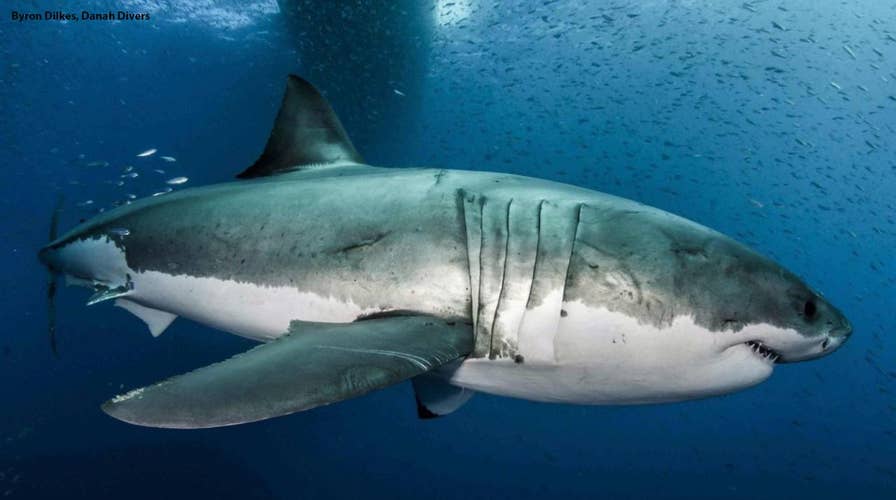The genome of great white sharks may hold the key to curing cancer
A new scientific study finds the genome of great white sharks may hold the key to finding a cure for cancer and other age-related diseases.
The entire genome of great white sharks has been decoded and the secrets that are unlocked may hold the answers to how to cure cancer and other age-related diseases.
The findings have been revealed in a new study in Proceedings of the National Academy of Sciences, which explains that DNA mapping may hold the clues to understanding the genetic alterations that are likely responsible for "the evolutionary success of large-bodied and long-lived sharks."
"Not only were there a surprisingly high number of genome stability genes that contained these adaptive changes, but there was also an enrichment of several of these genes, highlighting the importance of this genetic fine-tuning in the white shark," said Dr. Mahmood Shivji, director of NSU's Save Our Seas Foundation Shark Research Center and GHRI, in a statement. Shivji co-led the study, along with Dr. Michael Stanhope.
MEGALODON SHOCKER: HUGE KILLER SHARK MAY HAVE BEEN WIPED OUT BY GREAT WHITES
The research also shows that great whites, which have been around for nearly 16 million years, are capable of repairing their DNA, something that humans cannot. Sharks as a species have been around for more than 400 million years, according to the Smithsonian.
The genome itself contains 41 pairs of chromosomes (compared to 23 for humans) and a number of "specific DNA sequence changes." This allows sharks to maintain genome stability, which preserves the integrity of the genome, researchers found.
By contrast, instability in genomes, which is caused by damage done to the DNA, is known to cause cancer and other age-related diseases.
According to a 2014 study, great white sharks have an average lifespan of 70 years, though it varies between male and females. The world's largest known great white, a 20-foot behemoth known as "Deep Blue," is thought to be more than 50 years old.
The study also found that the great white genome contains a high number of so-called "jumping genes," or Long interspersed nuclear elements (LINEs).
"These LINEs are known to cause genome instability by creating double stranded breaks in DNA," Stanhope said in the statement. "It's plausible that this proliferation of LINEs in the white shark genome could represent a strong selective agent for the evolution of efficient DNA repair mechanisms, and is reflected in the positive selection and enrichment of so many genome stability genes."
The genome stability genes seen in the great white are also prevalent in the whale shark, a fish that can approach 40 feet in length and more than 20 tons. Size is important when it comes to developing the risk of cancer, as it should statistically increase with the number of cells and longer life spans. However, it does not hold up across species, as larger animals don't get cancer at a higher rate than humans, which may suggest they have developed "superior cancer-protect abilities."
"Decoding the white shark genome is providing science with a new set of keys to unlock lingering mysteries about these feared and misunderstood predators - why sharks have thrived for some 500 million years, longer than almost any vertebrate on earth," study co-author Dr. Salvador Jorgensen said in the statement.
The researchers also found that the genome contains the ability to rapidly heal wounds, including a "key blood clotting gene," Stanhope said.
Ultimately, more research is needed to determine whether sharks hold the key to helping humans solve these age-old issues.
"There's still tons to be learned from these evolutionary marvels, including information that will potentially be useful to fight cancer and age-related diseases, and improve wound healing treatments in humans, as we uncover how these animals do it," said Shivji.









































